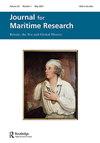“一份调查失败、毫无成果的记录?”:白鱼管理局,1951-1981年
Q3 Arts and Humanities
引用次数: 1
摘要
从1951年成立到三十年后与鲱鱼工业委员会合并,白鱼管理局一直是英国大部分渔业的政府发展机构。本文将WFA置于关于发展委员会效率的广泛辩论的背景下,对管理局的记录进行了调查和批评。它认为,尽管管理局在构想、经费筹措和管理方面存在弱点,但总的来说,管理局仍然是一股积极的力量。本文章由计算机程序翻译,如有差异,请以英文原文为准。
‘A record of abortive enquiries and empty of achievement?’: the White Fish Authority, 1951–1981
ABSTRACT The White Fish Authority was the government development body for most of the British fishing industry from its establishment in 1951 until its merger with the Herring Industry Board thirty years later. Setting the WFA in the context of wider debates over the efficacy of development councils in general, this article surveys and critiques the record of the Authority. It argues that despite weaknesses in its conception, financing and management, the Authority was nevertheless a positive force overall.
求助全文
通过发布文献求助,成功后即可免费获取论文全文。
去求助
来源期刊

Journal for Maritime Research
Arts and Humanities-History
自引率
0.00%
发文量
0
期刊介绍:
The Journal for Maritime Research ( JMR ), established by the National Maritime Museum in 1999, focuses on historical enquiry at the intersections of maritime, British and global history. It champions a wide spectrum of innovative research on the maritime past. While the Journal has a particular focus on the British experience, it positions this within broad oceanic and international contexts, encouraging comparative perspectives and interdisciplinary approaches. The journal publishes research essays and reviews around 15-20 new books each year across a broad spectrum of maritime history. All research articles published in this journal undergo rigorous peer review, involving initial editor screening and independent assessment, normally by two anonymous referees.
 求助内容:
求助内容: 应助结果提醒方式:
应助结果提醒方式:


